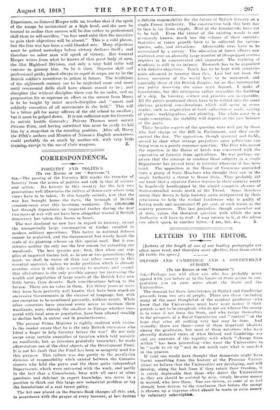CORRESPONDENCE.
FORESTRY AND POLITICS.
(To THE EDITOR OF THE " SPECTATOR."3
Sut,—The passing of the Forestry Bill marks the transfer of forestry from the arena of politics and talk to that of science and action. Its history in this country for the last two generations well illustrates the failure of democracy where long views have to be taken. It also happily records, now that the war has brought home the facts, the triumph of British common-sense over this besetting weakness. The £38,000,000 lost through dependence on imported timber during the first two years of war will not have been altogether wasted if British democracy has taken this lesson to heart.
The war disclosed no new fact in regard to forestry, except the unexpectedly large consumption of timber entailed in modern military operations. This factor in national defence cannot be neglected, and the Government has wisely based the scale of its planting scheme on this special need. But it con- stitutes neither the only nor the best reason for extending our woodlands. The best reasons are: first, that when our sup- plies of imported timber fail, as in one or two generations they must, we shall be worse off than any other country in this essential material, unless we make provision which is already overdue, since it will take a century to mature; and second, that silviculture is the only possible agency for increasing the wealth and population of large tracts of the British Isles now little better than deserts. Both considerations belong to the future. There are no votes in them. For thirty years or more they have been perfectly well known, they have been urged on successive Governments in the clearest of language, but, with one exception to be mentioned presently, without result. While other countries have strained every nerve to increase their woodlands, ours, already the smallest in Europe whether com- pared with total area or population, have been allowed steadily to decline both in extent and in productiveness.
The present Prime Minister is rightly credited with vision. Is the reader aware that he is the only British statesman who lifted a finger to help forestry before the war? He not only swept away certain anomalies of taxation which told unfairly on woodlands, but, as foresters gratefully remember, he made afforestation one of the chief objects of the Development Fund. It is not his fault that the Fund has been so meagrely used for this purpose. This failure was due partly to the paralysing division of responsibility witch existed between the Commis- sioners who held the purse and the three quite independent Departments which were entrusted with the work, and partly to the fact that a Commission, busy with all sorts of other questions and deficient in expert knowledge, was never in a position to think out this large new industrial problem or lay the foundations of a real forest policy.
The Act now placed on the Statute Book changes all this, and, in accordance with the prayer of every forester, at last fastens a definite responsibility for the future of British forestry on a single Forest Authority. The constructive task this body has to face is far from simple. Most of the foundations have yet to be laid. Even the extent of the existing woods is not accurately known, much less the volume of their contents. Statistics of forest growth have to be collected for various species, soils, and elevations. Afforestable sites have to be ascertained by a survey. The education of forest officers now scattered over an absurdly large number of ill-equipped centres requires to be concentrated and improved. The training of woodmen is still in its infancy. Research has to be organized with definite objectives. Touch has to be kept with countries more advanced in forestry than this. Last but not least, the forest resources of the world have to be measured, and especially those of the British Empire, for on this information any policy deserving the name must depend. I spoke of foundations, but this enterprise rather resembles the building of a ship. In forestry, science and practice are inseparable. All the points mentioned above have to be welded into the more obvious practical considerations which will occur to every reader, such as acquisition of land, collection of seeds, raising of plants, working-plans, and planting. The whole must be a single conception, for stability will depend on the just balance of the parts.
These broader aspects of the question were well put by those who had charge of the Bill in Parliament, and they easily carried the day. The opposition. though ignorant and feeble, served to show what strange prejudices some politicians can bring even to a purely economic question. The Peer who moved the rejection in the House of Lords was concerned with the separation of forestry from agriculture. He was perhaps un- aware that the attempt to combine these subjects in a single Department has proved fatal to forestry wherever it has been hied. The opposition in the House of Commons proceeded from a group of Scots Members who thought they saw in the single Authority a threat to Home Rule. They probably did not know that a separate Forest Service in their country would be hopelessly handicapped by the almost complete absence of State-controlled woods north of the Tweed. Some Members found their desire to help forestry quite overpowered by their reluctance to help the wicked landowner who is guilty of having made and maintained 97 per cent. of such woods as the country possesses. This last prejudice, though somewhat out of date, raises the thorniest question with which the new Authority will have to deal. I may return to it, if the editor can afford space, in another letter.—I am, Sir, &c., N.


































 Previous page
Previous page